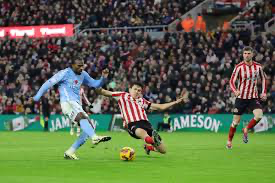
Sunderland’s recent performance at Millwall highlighted a concerning trend—doing the hard work to get ahead but failing to see it through. Aaron Connolly’s early strike, following an excellent assist from Dan Ballard, had them in a strong position, but the team couldn’t maintain their intensity after the break. Once again, they retreated too deep into their own half, allowing Millwall to counter and level the game with Finn Azeez’s equaliser, a goal that seemed inevitable given Sunderland’s shift to a more passive approach.
Questions about game management are starting to crop up. The team’s inability to manage the game after taking the lead in successive fixtures suggests doubts may be creeping into the players’ minds. While injuries and suspensions have certainly played a role in squad reshuffling, the lack of conviction in both halves is a recurring issue that needs to be addressed.
On a positive note, players like Chris Mepham, who continues to impress in defence, and Tommy Watson, who looked much more comfortable in his natural position, showed glimpses of what the future holds. Mepham’s calmness and composure in the absence of key defenders, like Trai Hume and Dennis Cirkin, was particularly notable, and despite the late equaliser, he was one of the standout performers. The emergence of young talents like Watson and Milan Aleksić also provides optimism, even if Aleksić’s missed chance will be remembered as a missed opportunity for a crucial three points.
Looking ahead, the return of key players, including Jobe Bellingham, Patrick Roberts, and Hume, should bolster the squad for the upcoming fixtures against West Bromwich Albion and Sheffield United. While the recent run of results has taken some of the buzz out of Sunderland’s season, the team’s potential is still evident, and a strong performance in the next few games could restore momentum. The focus now must be on maintaining their intensity throughout the 90 minutes and learning to control games better after taking the lead.
Leave a Reply